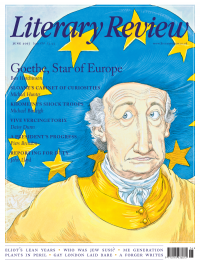Edith Hall
Flower Gathering
The Book of Greek & Roman Folktales, Legends & Myths
By William Hansen (ed)
Princeton University Press 549pp £24.95
At a time when fewer people than ever before are learning Latin and ancient Greek, stories first told in the ancient Mediterranean world are, paradoxically, enjoying a boom. It is not just that diverse children’s versions of The Odyssey and Aesop’s Fables remain some of the bestselling books of all time. Computer games such as Rise of the Argonauts and the God of War franchise have become the main point of access to classical antiquity for countless teenagers; Rick Riordan’s Percy Jackson & the Olympians books for young adults and their film adaptations constitute a multi-million dollar industry. Classical stories have proved just as appealing to writers in more elevated literary genres and those designed for more mature age groups. Alice Oswald’s 2011 Memorial is the best poem responding to Homer’s Iliad for decades. Gary Owen’s one-woman tragedy Iphigenia in Splott, which last year updated Euripides’s Iphigenia in Aulis to a Welsh housing estate, won deserved acclaim and a transfer to the National Theatre. Ali Smith’s ‘Brexit’ novel Autumn (2016) was a multilayered response to the Roman poet Ovid. Colm Tóibín’s new House of Names turns the story told in Aeschylus’s Oresteia into an exquisite new novel. No self-respecting reader or writer can afford to neglect their classical authors.
Fortunately, the major Greek tragedians and Ovid are available in standard mass-market translations published by Penguin or Oxford World’s Classics. But with most of classical literature, a treasure trove of storytelling, the problem is where to start. There are dozens of canonical classical authors who worked between the eighth century

Sign Up to our newsletter
Receive free articles, highlights from the archive, news, details of prizes, and much more.@Lit_Review
Follow Literary Review on Twitter
Twitter Feed
Though Jean-Michel Basquiat was a sensation in his lifetime, it was thirty years after his death that one of his pieces fetched a record price of $110.5 million.
Stephen Smith explores the artist's starry afterlife.
Stephen Smith - Paint Fast, Die Young
Stephen Smith: Paint Fast, Die Young - Jean-Michel Basquiat: The Making of an Icon by Doug Woodham
literaryreview.co.uk
15th-century news transmission was a slow business, reliant on horses and ships. As the centuries passed, though, mass newspapers and faster transport sped things up.
John Adamson examines how this evolution changed Europe.
John Adamson - Hold the Front Page
John Adamson: Hold the Front Page - The Great Exchange: Making the News in Early Modern Europe by Joad Raymond Wren
literaryreview.co.uk
"Every page of "Killing the Dead" bursts with fresh insights and deliciously gory details. And, like all the best vampires, it’ll come back to haunt you long after you think you’re done."
✍️My review of John Blair's new book for @Lit_Review
Alexander Lee - Dead Men Walking
Alexander Lee: Dead Men Walking - Killing the Dead: Vampire Epidemics from Mesopotamia to the New World by John Blair
literaryreview.co.uk